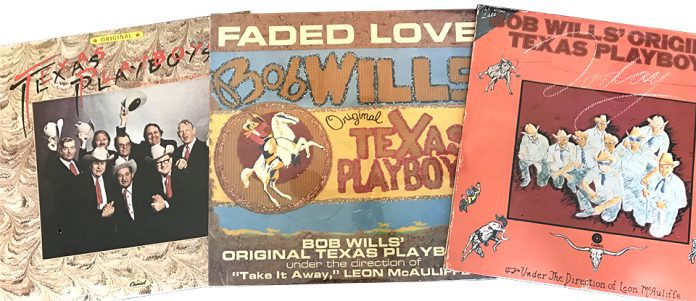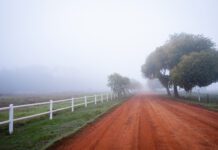
In February 1934, a Texas expatriate named Bob Wills brought his ragtag group of musicians to Tulsa, where they auditioned for a slot on a radio station. Fans of Oklahoma music know how that turned out.
Broadcasting six days a week over the far-reaching KVOO and eventually making Cain’s Ballroom their base of operations, Bob Wills and his Texas Playboys forged and popularized the unique amalgam of country, jazz, blues, pop, fiddle and Mexican border music that became known throughout the world as Western swing.
At one time during the big-band era of the 1940s, the Wills band was the top-grossing touring act in America and regularly bested the outfits of Benny Goodman, Tommy Dorsey and Harry James at the nation’s box offices. That kind of popularity was impossible to sustain, but the cigar-chomping, fiddle-playing Wills reigned for decades as the undeniable king of Western swing.
Even at the Cain’s, however, where Johnnie Lee Wills held forth with his own excellent outfit following brother Bob’s departure, Western swing went into eclipse during the rock ’n’ roll era – then bounced back in the early ’70s. Much of the nationwide rebound had to do with the then-red-hot Merle Haggard, whose 1970 album, A Tribute to the Best Damn Fiddle Player in the World, brought Bob Wills and his songs back into the country music mainstream.
Buoyed by this renewed attention, Wills began recording an album featuring many of his former Playboys, as well as Haggard, in late 1973. Sadly, early in the recording of what would be a multi-record set called For the Last Time, he suffered a major stroke and never performed or recorded again.
But the music Wills had done so much to create and popularize remained on an upswing. Following Wills’ death in 1975, his widow, Betty, enlisted former Texas Playboys steel guitarist Leon McAuliffe to lead a touring and recording band of former Wills musicians, sanctioned by the estate, to be called Bob Wills’ Original Texas Playboys. Such was the rejuvenated popularity of Western swing at the time that the band got a deal with the giant Capitol Records, which released three new Texas Playboys albums between 1977 and 1979. After the dawning of the ’80s, the group moved to a smaller but more empathetic label, Delta Records out of Nacogdoches, Texas.
And this is where Brett Bingham comes into the story.
In the summer of 1981, Bingham was a high school student, not quite old enough to drive. I was a writer struggling to get established and working a deejay stint at Claremore’s KWPR (“The Voice of the Will Rogers Metroplex”) to support my writing habit. I was also a Western swing fan, and the Warren family, who ran the radio station, allowed me to play exactly one swing tune every day at noon.
At the time, the Hank Thompson School of Country Music was still going at what was then Claremore College (now Rogers State University), with McAuliffe as director. He occasionally gave concerts featuring the school’s students, and it was at one of those – held at the college’s outdoor amphitheater – that I bought the Playboys’ first Delta album, Faded Love, from Bingham in an effort to expand my noonday material.
Born in Tulsa some 23 years after Bob Wills left town for what turned out to be a short stint in the military, Bingham had grown up around some of the best-known Texas Playboys. This upbringing was due to his father, Archie, and Archie’s Tulsa-based brother, Ray, one of the region’s top country music booking agents, producers and managers.
“At this point, I was living in northwest Arkansas,” Bingham says. “Leon [McAuliffe] was running radio station KAMO in Rogers, and Smokey Dacus [Bob Wills’ first drummer] was working there. I have these memories of going to Rogers with my dad to see them, and them coming by my dad’s upholstery shop, especially Leon, and just always being around them.”
Yet his proximity to these men in no way lessened his sense of wonder about them and their music.
“These guys were fascinating to me,” he says. “I’d go as far as to say that they were to me what the Beatles must’ve been to other people. They were my idols.”
It was because of his great regard for Western swing and the musicians who made it that an even younger Bingham had started a fan club for Bob Wills’ Original Texas Playboys, following a meeting with country legend Ernest Tubb and his fan club president, Norma Barthel.
“In the ’70s, every country star had a fan club,” Bingham says. “I was so enamored of what Norma was doing with Ernest Tubb, and she encouraged me. I didn’t know if I could pull it off or not, but I said to Leon, ‘You guys need a fan club,’ and he said, ‘Well, yeah.’
“I don’t know if he thought I could pull it off, either. But I got a check for $50 from Leon’s wife, saying she wanted to be a charter member of the club. Then Betty Wills sent me a check for $50. And then my dad gave me a check for the same amount. So I had $150, by golly, and we are going to spread the cheer,” he adds with a laugh.
Soon, thanks to his mother’s job at a vo-tech high school with a print shop, Bingham was – in those pre-internet days – producing a bimonthly newsletter about the Texas Playboys and mailing it to the fan club’s members around the country. He also attended as many Playboys shows as possible to recruit club members and sell albums McAuliffe provided him.
“I just immersed myself in that culture,” he says. “I loved it. I loved being around all those guys. It’s always been something I’ve wanted to help keep alive.”
Through the years, Bingham has done just that by booking Western swing events – often working with his uncle Ray – and becoming involved with the Bob Wills Heritage Foundation. The Texas Playboys have persevered as well, most recently under the leadership of longtime Playboys vocalist Leon Rausch and Oklahoma music figure Tommy Allsup, a Bingham family friend.
But Allsup died in 2017 just as Rausch approached 90. Last year, Rausch publicly passed the bandleader baton to Jason Roberts, a first-class fiddler-vocalist and Western swing figure who, as a member of the group Asleep at the Wheel, actually played Bob Wills in the touring musical A Ride with Bob.
Now the Texas Playboys continue, as did the originals, with a blend of Oklahoma and Texas musicians – the former including such longtime Playboys as Tulsa-based horn players Steve Ham and Mike Bennett, along with drummer Tony Ramsey and fiddler Shawn Howe.
Unsurprisingly, Bingham is Roberts’ partner in this enterprise, booking the Texas Playboys with the blessing of the Bob Wills estate.
“I knew who Jason was when he started with Asleep at the Wheel, but I was just a fan,” Bingham says. “I didn’t know him until after he’d been with the Wheel, oh, seven or eight years, but once we became friends, we understood we were on the same page.
“We have a huge desire to perpetuate this. Obviously, he’s got the talent and the ability to do it musically – and I’ve got the desire, I guess.”
Bob Wills’ Texas Playboys, under the direction of Roberts, are scheduled to make their first Cain’s Ballroom appearance March 2 while playing for the annual Bob Wills birthday celebration. The evening begins with a live broadcast of my public radio Tulsa show, Swing on This, from 7 to 8 p.m. For ticket information, visit cainsballroom.com.






















